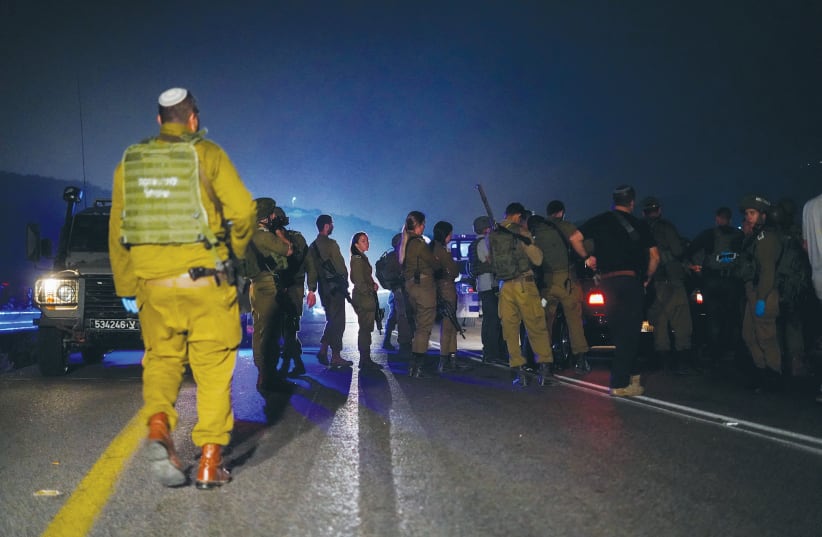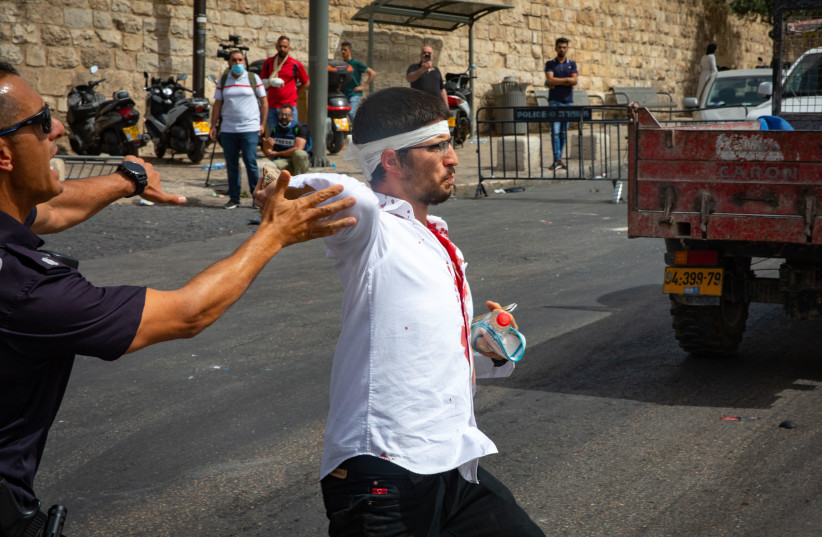Another day, another terror attack. A stabbing. A car ramming.
Every day of Hanukkah we woke up in Israel to another report of a “minor” incident. Not so newsworthy, the victims should be able to survive their only minor injuries.
On the second night of Hanukkah, a bus heading to Eilat was pelted with stones and window glass was shattered. A holiday miracle as no one was seriously injured?
The incident received an official response from Transportation Minister MK Merav Michaeli: “Drivers of public transportation vehicles must be protected and arrive safely to their destination. I was glad to be briefed thoroughly by the public security minister on the steps that the southern district is taking to bring safety and a feeling of safety to the area, particularly the safety and security of road users. As someone committed to the concerns of drivers and passengers, I will continue to raise the status of the drivers and monitor police activity in the area to prevent recurrence of these incidents.”
However, the issue of road safety is not limited to southern Israeli roads. Stones were thrown at a bus driver and his family as they entered the east Jerusalem neighborhood of Isawiya on a Saturday evening in April and the bus sustained significant damage.
A 30-year-old bus driver was lightly injured after stones were thrown at his bus near the Hizma checkpoint in northern Jerusalem on Saturday night, November 27. According to Magen David Adom, the driver was transferred to Shaare Zedek Medical Center with light wounds caused by glass shards.
Minister of Public Security Omer Bar-Lev added to Michaeli’s statement: “Incidents of stone-throwing at buses are in addition to the difficult situation in the south and the relaxation of enforcement that followed the May 2021 disturbances. We will not allow this to continue. Over the last two months, the southern district has begun implementing advanced plans to deal with violence and crime across the Negev, increasing police and Border Guard forces in the sector and many other programs that are already showing initial results. They are leading to significant arrests and the quick apprehension of suspects. But so long as even one citizen feels unsafe to travel the roads, we have a lot of work ahead of us and the true test is how the sense of security of people in the south and road users improves. The south is no longer lawless.”
Finally, while pelted and damaged Israeli buses aroused the attention of government officials to make statements about bus attacks, what about the safety of private vehicles? In particular, what about lone female drivers on roads in Judea and Samaria who have become at increased risk. These women are seen as easy targets, less likely to have a weapon or respond to rock-throwing than young men and youths.
TAKE FOR example, Rebecca K. She was on a routine, weekly drive from Efrat to Tekoa to babysit for her grandchildren. All her previous trips over the years were uneventful. However, on Thursday, November 25 at 3:15 p.m., after a left-hand turn at the T-junction in eastern Gush Etzion, she was attacked.
She related that it was difficult to remember everything – it all happened so fast, seeing a youth – about 16 years old, and seemingly another guy tightly at his side. They came out of nowhere in the fields. The male who she saw had his head covered with a black scarf and his hand was cocked, holding a brick ready to throw. And, throw he did! He/they blasted the front windshield, shattering the glass. The hood of the car was also hit by something, presumably a brick, and damaged severely.
“Thank God I kept my wits about me and just kept driving. I continued on to my final destination of Tekoa,” she said.
Usually, she had noticed one or more soldiers patrol along the route, but none were seen that day. Once she entered Tekoa, the guard at the gate was “very kind and got the ball rolling” reporting the incident to both the police and to the army.
Rebecca’s message is “I was very lucky, but this must stop.”
Being able to remain in control, she did not crash her car, plus she escaped with no physical injuries from the shattered glass. According to an Israeli police spokesperson, every incident is taken seriously and investigated by the police and the IDF.
Israelis are noticing an increase in the stoning/rock-throwing incidents, which they took for granted in the past and did not bother to report. Amichai Gurfinkel, originally from Shiloh and now in Baruchin, was used to Israeli cars having rocks thrown at them as they drove on the roads in the area. However, when his wife had her car stoned twice in one day in the same area he became involved in organizing with other residents of Eli. A protest was held on November 25 near the entrance of Lubban Sharkiya, an Arab village with a school for boys, who are alleged to throw rocks at Israeli cars.
On the front page of The Jerusalem Post on December 7, Khaled Abu Toameh reported: “It’s hard to point to a specific reason for the latest wave of terrorist attacks in Jerusalem and the West Bank,” but as the headline acknowledged incitement has stoked a rise in attacks.
The United Nations Security Council has called for Israel to do better to protect “Palestinians from settler violence.” Such violence is the rare exception and widely condemned by the overwhelming number of Israelis but widely reported by international media. The violence against the Israelis, however, is so common it has been taken for granted.
I have no solution to the rising incitement and increase in attacks. However, the first step has to be awareness of the extent of the problem. The mainstream media have not shared the common everyday smaller events. Too many lives are at stake for the current situation to be ignored.
It is time for all violence to be dealt with and stopped.
The writer made aliyah 15 years ago and is an accredited photojournalist based in Jerusalem.

